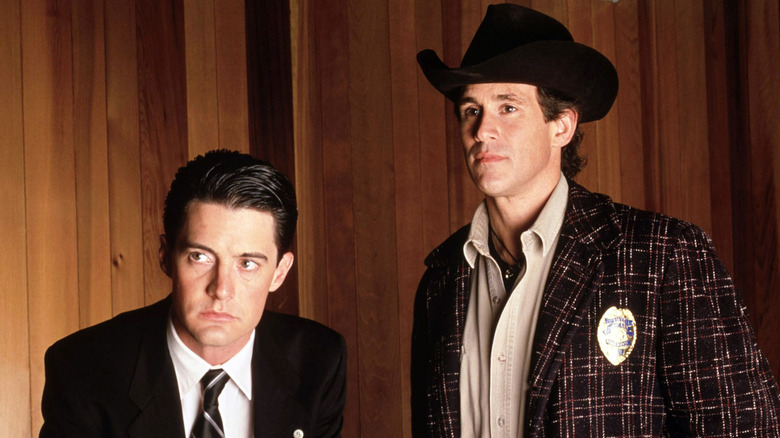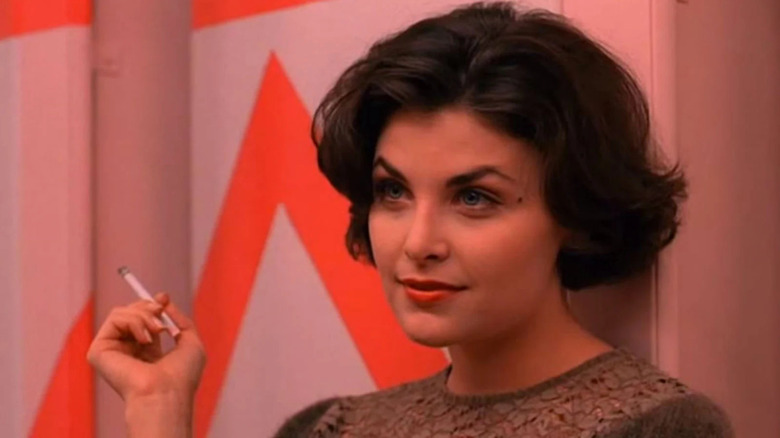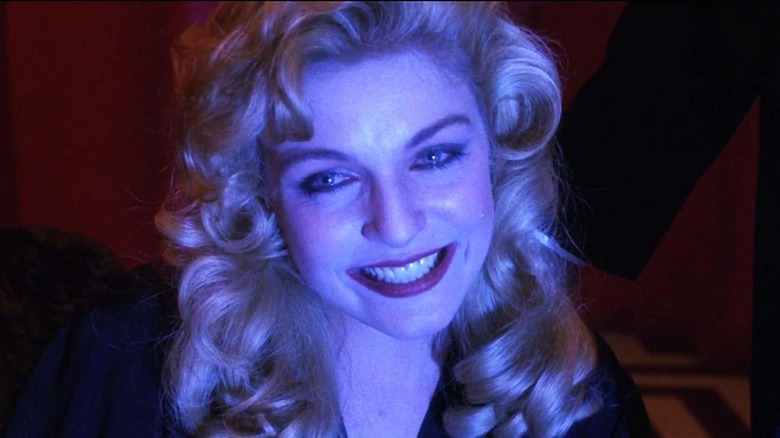Angelo Badalamenti's Twin Peaks Theme Music Is Unlike Any Other Score – And It's Perfect
The further we get away from the premiere of its pilot, the harder it is to understand how David Lynch and Mark Frost's "Twin Peaks" briefly seized the imaginations of American television viewers. On April 8, 1990, the 90-minute pilot scored what would be the highest single movie rating of the 1989-90 network season. Throughout that month, the show found its way onto the cover of just about every major mainstream magazine, regardless of the periodical's emphasis. People who would've run screaming from Lynch's "Blue Velvet" were enthralled by the series' central "Who Killed Laura Palmer" mystery. They fell in love with Kyle MacLachlan's charmingly idiosyncratic FBI Agent Dale Cooper and Sherilyn Fenn's high school hellion Audrey Horne. They threw viewing parties with coffee, donuts and pie.
After a decade-plus of gorging on nighttime soaps like "Dallas," "Dynasty" and "Falcon Crest," mainstream TV audiences were inured enough to their hoary conventions to handle a funhouse mirror reflection of the genre. But to fall under the show's quirky, Lynch-ian spell, to glory in those ineffably beautiful beams of hope that intermittently cut through the multi-generational gloom of a small town burdened by the most awful of secrets, viewers needed a rare kind of spiritual buttressing.
They needed Angelo Badalamenti.
Crafting the vibe of a strange, scary town
The vast majority of television drama scores in 1990 were musical wallpaper. They were designed to go unnoticed. While a show's main theme could become a hit single (e.g. Mike Post's "Hill Street Blues" reached number 10 on Billboard's Hot 100), no one was clamoring for a full soundtrack of the incidental cues from "The A-Team."
Angelo Badalamenti's score for "Twin Peaks" changed this overnight. His main theme was a stunningly delicate departure from the brassy compositions that kicked off the aforementioned soaps. Accompanied by a assortment of idyllic images from the Pacific Northwest (pine trees, waterfalls, a varied thrush and, cheekily, whirling saw blades), Badalamenti's composition mesmerizes us, placing us in a dream state where of course our protagonist will seek the counsel of a backwards-speaking little person (Michael J. Anderson) as he attempts to solve the murder of high school senior Laura Palmer (Sheryl Lee).
The variety of musical genres deployed by Badalamenti was crucial as well. His jazzy "Audrey's Theme," with its slithery snare brushes, finger snaps and clarinet, got us on Sherilyn Fenn's groovy wavelength, inviting us to sway along to the walking bassline playing in her head. It was the strangest act of teenage rebellion I'd ever seen. With the exception of Winona Ryder, there wasn't an actor at the time who could make being a total weirdo seem so damn sexy and cool. And the cult of Audrey, to which I will belong for the rest of my days, would've never formed such a fiercely dedicated clutch of adherents without Badalamenti's hypnotically sensual cue.
The composer as co-writer
But the beautiful, battered soul of "Twin Peaks" was Laura Palmer, a character we wouldn't truly get to know until Lynch's post-cancelation film "Fire Walk with Me." While Lee made the most of her brief scenes (and more when she turned up later in season 1 as Laura's ill-fated cousin Maddy), the awful tragedy of this young woman's life was communicated via Badalamenti's ethereally heartbreaking "Laura's Theme." That piano melody that rises out of the ominous, three-note murk is Laura. It's halting, suspicious, then trusting. Suddenly, it takes flight and crescendoes to an angelic climax. Laura is with us. She's broken free from her anguish and despair. But she cannot bask in this moment forever because, as Lynch would remind us time and again, she is doomed. And so she falls back to that three-note dirge.
There isn't a more transcendent piece of scoring in film or television history. And to hear Badalamenti describe how the cue came to be, you realize that he was more than just a composer. He was an active collaborator in the telling of the story. Everything that is wonderful and perplexing and terrifying about "Twin Peaks" is expressed with uncommon purity through Badalamenti's music (and occasionally given lyrical voice by the late Julee Cruise, whose performance of "Questions in a World of Blue" in "Fire Walk with Me" is utterly shattering).
While I sincerely hope Lynch continues to make movies and television, it is crushing to know that, if he chooses to do so, he won't have Badalamenti, who died Sunday at the age of 85, at his side. Only Badalamenti could conjure the churning, rockabilly horror of "The Pink Room." He was a singular artist who wrote lovely scores for other filmmakers, but he was integral to expressing the menace of "Blue Velvet" and the homespun decency of "The Straight Story." There have been Lynch films without Badalamenti, but I cannot imagine a return trip to "Twin Peaks" without him. He is at peace, and now, at long last, so is Laura.


